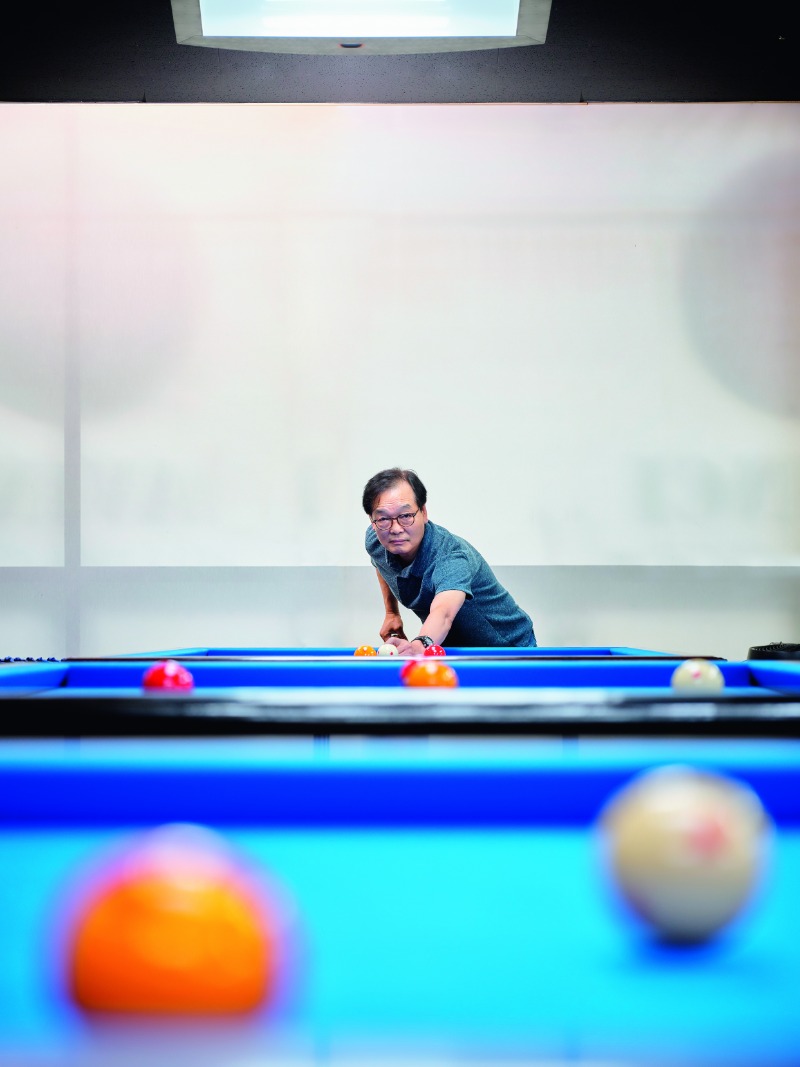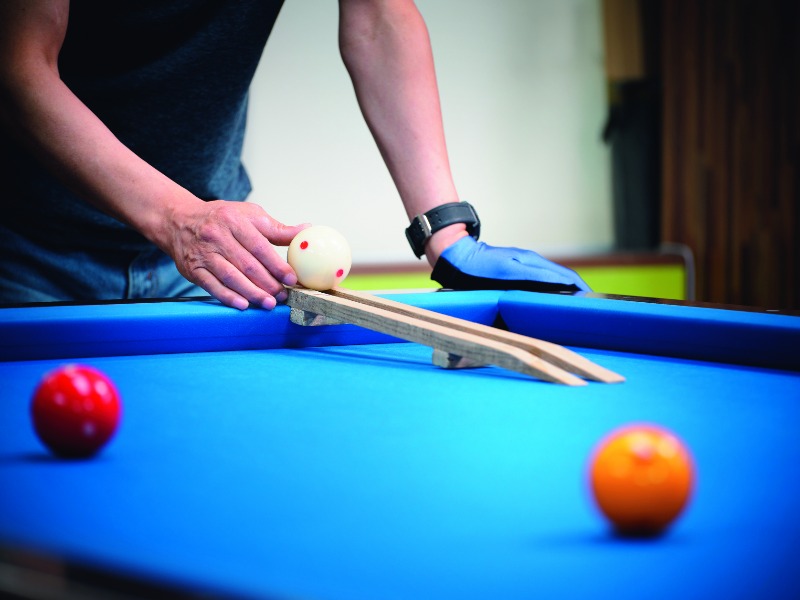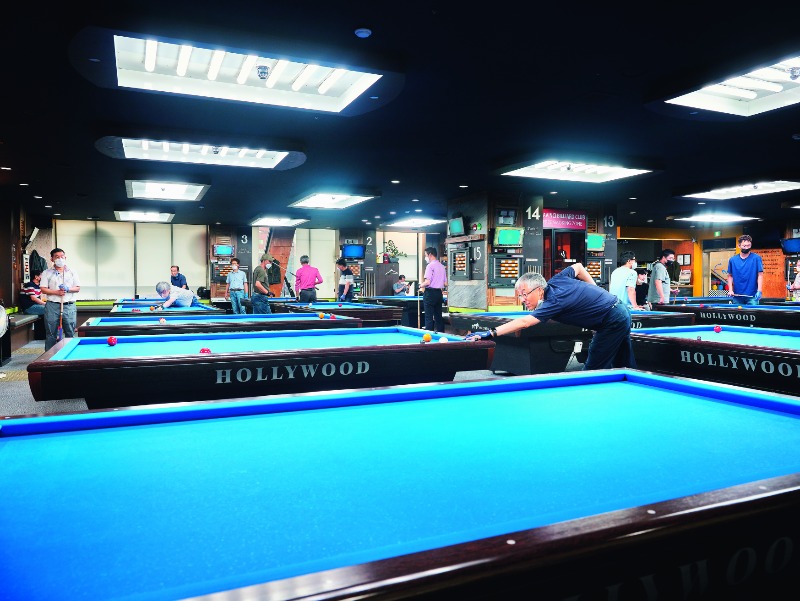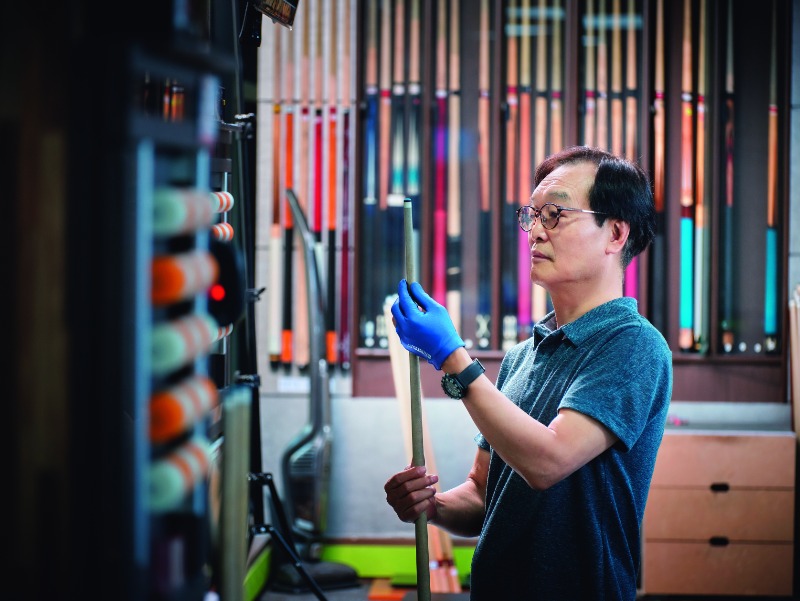Kim Man-youn combines 30 years of corporate experience and exceptional billiard skills in his retirement job as the owner of a pool hall. His stress on maintaining a friendly atmosphere and paying attention to people keeps him ahead of thousands of competitors.

Retiring after 30 years as an office worker, Kim Man-youn took out a new lease on life as the owner of a pool hall. To Kim, nothing is more important than genuinely caring customer service.
“Two okdoldae [bi l liard tables] were kept in the eastern corridor of Injeongjeon [throne hall of Changdeok Palace], and from time to time he would take up a cue with members of the court.”
This passage appears in Sunjong gukjangnok, a photo album documenting the funeral of King Sunjong, the last ruler of the Joseon Dynasty and such a billiards enthusiast that he designated Monday and Thursday as “billiards day” (okdolui nal).
The first billiard table in Korea appeared in 1884 in Jemulpo port (today’s Incheon), thanks to an American missionary. Fifteen years later, billiard balls were racked up in the royal court for the first time. By the time King Sunjong was enjoying the game, many Japanese-run billiard halls were already thriving.The first Korean-owned hall, Mugungheon, opened in 1924 and became a social hub of the upper class. Some 100 years later, billiards is enjoyed across all social classes. In 2021, there were nearly 16,000 registered billiard halls in Korea, and in a survey of 9,000 men, 1,125 said they played more than once a year. More than a few frequent the DAVINCI Billiard Club and Academy.
HEARTFELT GREETING
Stroll through any alleyway in Seoul’s Guro Digital Complex, and a seemingly endless forest of “Billiard Hall” (danggujang in Korean) signs scream for attention. Many players make their way to DAVINCI by 4 p.m., when owner Kim Man-youn begins his workday. His first task is to weave through the tables and dole out heartfelt greetings and friendly banter.
“Around here, there’s basically a billiard hall in every building. So, to get customers to come to ours, we’ve got to be different somehow. The most effective method I’ve found is greeting every customer. I always take a little stroll around the place. A ‘Good to see you’ here, an ‘Anything you need?’ there – just, hellos and goodbyes and the occasional joke. Tell me, what do you think a billiard club actually sells?”
Service? “That’s right,” Kim declares. “We’re in the service industry. The actual players are the ones who sell the game. That’s why it’s important for the owner or the manager to always be around, so people can see them working hard – because people are coming for the service. We need to be able to anticipate our customers’ needs, to give them what they want even before they ask.”
Kim’s workday officially lasts six hours. He heads home at 10 p.m., when the night manager arrives. But not before he circles the tables another time. Handshakes, high fives, and knowing looks and nods abound. “Whenever I hire a new employee, the first thing I talk to them about is how we greet our customers. You know, it’s important to always have respect in your heart, and to express that respect to people, that’s what a real greeting is. And to me, that’s where real service begins.”
Before opening the pool hall, Kim was an office worker for 30 years. Most of that time he spent in planning and coordination at a major corporation. There, Kim became keenly attuned to service and customer satisfaction.
SECOND CAREER
Kim retired in 2021, but after two months of idleness, he became restless. “Maybe because I’ve worked my whole life, all that relaxation wasn’t actually very…relaxing. I started wondering whether I should try something new, and then I wondered what that something might be,” Kim recalls. “Eventually, I asked my kids what they thought, and my second oldest daughter said, ‘Well, Dad, what are you good at?’ I told her, classical guitar, golf, bowling, Go, billiards – I’m good at them all! And she told me billiards seemed like the best bet. She said just relax, and do it on the side. I knew how to play billiards but I didn’t know how to run a business, so I went and bought a book.”
The title was “Maybe I’ll Open a Pool Hall?” One passage really caught his attention. “It said something like, ‘200s will succeed, and 1,000s will fail.’ This means a 200-level player will work hard to provide his customers with good service, but a 1,000-level player will end up trying to teach his customers, and go out of business.”
In fact, Kim actually is a 1,000-level player (in four-ball billiards) – as high as many professionals – but he took the lesson to heart as he acquired his first hall: “Don’t try to teach your customers!”
Just when Kim was becoming accustomed to operating a pool hall, the owner of the hall next door lured all his regulars away with promises of better facilities and service. As his customer base dwindled, he fell deeper and deeper into the red, falling behind on rent payments. That was when he decided to tack in a different direction and teach his customers after all. He began writing a column for a famous online billiards forum, calling it “The Math and Physics of Billiards.”
“In middle and high school, you learn the formulas, and then in college, you learn how the formulas are created. In your basic billiard primer, all you get are the formulas. You can memorize them as is, but you’ll forget them right away. Once you really internalize the principles, though, that’s when you can start getting creative. That’s where I put my focus. I spent a full year, you know, printing out one sheet at a time and handing them out to customers.”Business slowly improved, but not enough for Kim’s pool hall to get out of the red. As he began to consider quitting, a close friend and professional pool player, who also was on the National Billiards Team, suggested that they tour the Guro Digital Complex. A relatively recent development on the site of the old Guro Industrial Complex, once the heart of Korea’s textile and other labor-intensive industries, the area is now a hub for IT companies and teems with young professionals taking their first steps into the real world. Foot traffic is nonstop, as the whole area bustles every hour of every workday. “We got here around six in the evening, and people were basically lining up to catch the subway home. When I came back a second time, it was to sign a lease,” Kim said.
The first location lasted two years. The second and current location for the past eight years. The space is 363 square meters, and holds 16 tables. A month’s rent is ten million won (about US$7,500). On the first day, the takings came to only 300,000 won, but within the first two weeks, the daily amount exceeded 1,000,000 won.
Around 10 percent of the annual income is reinvested into the business, for example, purchasing new cue sticks and other equipment. Officially open from 10 a.m. to 2 a.m. the next day, the pool hall may stay open as late as 5 a.m. if there are customers. During the day, the customers are mostly retirees in their sixties, enjoying their free time. After the workday, the hall fills up with office workers in their thirties to fifties. On weekday mornings, a wave of teens and twenty-somethings take up their posts. Each day, DAVINCI averages more than 100 customers.

To Kim Man-youn, playing billiards isn’t just entertainment – it’s science. In his own book, Kim writes: “Billiards are physics, operated according to Newton’s laws of motion, and the angle of that motion is mathematics.”

The pool hall is constantly bustling. During the day, customers in their sixties enjoy their leisure time. After the workday, office workers unwind. And in the wee hours after midnight, young people delay their bedtime.
EXCEPTIONAL SERVICE
Kim learned to play billiards fresh out of high school, when he was attending a prep academy to retake his college entrance exams. Asked whether he was a natural, his answer is matter-of-fact: “No such thing. It’s all about study and effort.” “It was 1974 when I entered university, and back then there wasn’t much of an entertainment culture to speak of. But about ten years ago, we got a cable channel that was all billiards all the time, and a lot of new people began learning the game. When it was selected as an official event for the 2010 Guangzhou Asian Games, well, billiard halls basically became sports facilities.”
As the number of people playing billiards grew, the number of new halls skyrocketed as well. A sudden surge in “senior start-ups” added fuel to the fire, driven by the growing population of retirees dreaming of a new lease on life. According to the National Office of Statistics, five out of six new businesses opened by seniors over the age of sixty failed in 2020. In order to survive, it was necessary for Kim to offer differentiated service.
“It’s nice to have some extra space, so people can have a seat and take a break, but our club is so packed full of tables that it’s not that nice,” Kim admits. “We work hard to make up for it, though, and improve things wherever we can. Each table has a VAR (Video Assistant Referee) system installed, so if there’s any kind of conflict over a game, you can check the video playback. Before 6 p.m., you get an unlimited number of games for just 11,000 won. And at least once every hour, we bring a beverage cart around and ask everyone, ‘Is there anything you need?’ There are no clocks on the walls. If there’s something on a wall, you end up looking at it, and if there’s something to read, you end up reading it, and all that just breaks your focus. We don’t even have call buttons. That’s us saying, we’ll come to you before you have to call us.”
“When you’re older and retired, and spending time with your friends, you get the most bang for your buck all around with billiards,” according to Kim. It does not cost much, and you have to use your brain, so it is good for preventing dementia, too. Kim’s online billiard column was recently published as a book, and has been causing quite a buzz. Not surprisingly, he has attracted new customers to DAVINCI, and these days, Kim even gives private lessons to some of them. “Playing billiards is basically physics, where you can apply Newton’s laws of motion wholesale – and the angle of that movement is mathematics.” This sentence is from the cover of Kim’s book. Turn the page, and right there is a diagram and the Pythagorean theorem. Kim gets a real thrill from watching people truly understand a formula rather than just memorizing it; he loves seeing their skills improve by the day.
Billiards, of course, but also golf, classical guitar, poker, and Go: Kim can claim skills that go beyond those of any regular amateur in each of these arenas, but there is, apparently, still room for more. Recently, he’s become a mountain bike aficionado. Every Sunday, after a work week that spans Monday through Saturday, he takes his bike into the mountains.
“When my youngest son gets married, I want to play a classical guitar piece at his wedding. That’s my dream. I’m retired now, so my job is really to enjoy my life as much as possible,” he said.
After thirty years as a member of the workforce, a project that began with “Maybe I’ll Open a Pool Hall?” has become a source of new energy and drive. For Kim, retired life is as full of territories to explore and enjoy as before.

The pool hall lacks much space for sitting and lounging, but the facilities are well-kept and customers can count on the kind of customer service that anticipates their needs.
Hwang Kyung-shinWriter
Lee Min-heePhotographer